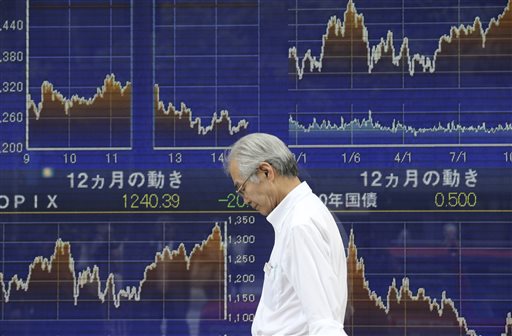
A man walks by an electronic stock board of a securities firm in Tokyo on Oct. 10, 2014. Most Asian markets came under fresh selling pressure Monday, Oct. 13, while the dollar dipped and oil hit multi-year lows, following another round of losses on Wall Street fueled by global growth concerns. AP PHOTO/KOJI SASAHARA
HONG KONG–Most Asian markets came under fresh selling pressure Monday, while the dollar dipped and oil hit multi-year lows, following another round of losses on Wall Street fueled by global growth concerns.
However, Shanghai pared initial heavy losses and Hong Kong ended in positive territory after Chinese official data showed a better than expected rise in the mainland’s exports and imports.
Investors are warily watching events in Hong Kong as clashes erupted in the city between pro-democracy protesters and masked men, hours after police began removing barricades that have blocked some main roads for the past two weeks.
Shanghai, which sank more than one percent in early trade, ended down 0.36 percent, or 8.53 points, at 2,366.01.
Hong Kong reversed morning losses to close 0.24 percent higher, adding 54.84 points to 23,143.38.
Sydney gave up 0.63 percent, or 32.8 points, to close at 5,155.5 and Seoul ended 0.71 percent lower, easing 13.71 points to 1,927.21.
Tokyo was closed for a public holiday.
Global markets have felt the effect in recent weeks as traders fret over the state of the global economy, with China, the eurozone and Japan struggling even though the United States is clawing its way back to health.
The latest indicators on the global outlook came from Beijing Monday, with official data showing September exports rose 15.3 percent year on year and imports climbed 7.0 percent.
The rise in exports accelerated from August’s 9.4 percent and was ahead of the median forecast of 12.5 percent. The forecast had predicted a fall of 2.4 percent in imports, matching a surprise decline in August.
Customs spokesman Zheng Yuesheng attributed the improvement to a recovery in major economies and a strengthening of external demand.
“The good momentum is expected to continue in the fourth quarter,” he added.
But while the figures beat expectations, traders are still worried about the strength of world’s No. 2 economy.
Desmond Chua, market analyst at CMC Markets, told Dow Jones Newswires the data “was a lot more disappointing than we had expected” and “cements the view that China might be in for quite a hard landing.”
Hong Kong clashes
On currency markets, the dollar eased to 107.36 yen from 107.65 yen in New York Friday, while the euro was at $1.2665 against $1.2627.
The single currency was also at 136.01 yen, from 135.97 yen.
The yen, which is considered a safe bet in times of turmoil, has rallied in the past as equities markets have fallen.
Wall Street’s three main indexes ended in the red on Friday. The Dow fell 0.69 percent, the S&P 500 tumbled 1.15 percent and the Nasdaq slumped 2.33 percent.
In Hong Kong dozens of masked men rushed barricades at the main pro-democracy site Monday, triggering clashes, hours after police had moved in to remove some barriers and shrink the site.
Taxi drivers, many of whom have voiced frustration with more than two weeks of protests that have blocked roads and caused traffic gridlock, added to the fray by converging on the site–beeping horns and shouting at demonstrators.
Oil prices tumbled again on pessimism about demand. US benchmark West Texas Intermediate for November delivery fell $1.45 to $84.37– its weakest for two years–while Brent North Sea crude lost $1.79 to a four-year low of $88.42.
Gold was at $1,227.19 an ounce against $1,222.00 late Friday.
In other markets:
— Mumbai advanced 0.33 percent, or 86.69 points, to end at 26,384.07 points.
Tata Power gained 2.90 percent to 85.10 rupees, while Mahindra & Mahindra lost 3.66 percent to 1,270.10 rupees.
— Malaysia’s main stock index fell 11.68 points, or 0.65 percent, to 1,797.20.
Malayan Banking shed 0.7 percent to 9.63 ringgit, while Petronas Gas lost 2.8 percent to 21.36. Malaysia Airlines gained 2.0 percent to 0.26 ringgit.
— Taipei tumbled 2.84 percent, or 255.05 points, to 8,711.39.
Taiwan Semiconductor Manufacturing Co. shed 3.6 percent to Tw$120.5 while leading chip design house MediaTek lost 4.05 percent to Tw$403.0.
— Wellington fell 1.05 percent, or 55.09 points, to 5,170.05.
Air New Zealand closed down 2.13 percent at NZ$1.84 and Fletcher Building was off 0.57 percent at NZ$8.67.
— Manila plunged 2.78 percent, or 199.26 points, to 6,968.09.
Alliance Global fell 4.96 percent to 24.90 pesos while Ayala Land dived 4.62 percent to 32 pesos. GT Capital shed 2.78 percent to 1,050 pesos.
— Jakarta ended down 1.01 percent, or 49.91 points, at 4,913.05.
Auto company Astra International fell 2.31 percent to 6,350 rupiah, while cement maker Semen Indonesia gained 1.68 percent to 15,100 rupiah.
— Singapore closed 0.67 percent, or 21.72 points, lower at 3,202.15.
DBS Bank fell 1.32 percent to finish at Sg$17.99 and Singapore Telecom ended 0.80 percent lower at Sg$3.71.
— Bangkok lost 0.67 percent, or 10.37 points, to end at 1,542.35.
Giant oil company PTT fell 3.30 percent to 352 baht, while Bangchak Petroleum dropped 2.90 percent to 33.50 baht.